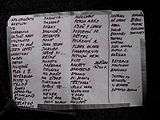Jaromír Nohavica
| Jaromír Nohavica | |
|---|---|
|
Jaromír Nohavica | |
| Background information | |
| Born |
7 June 1953 Ostrava, Czechoslovakia |
| Genres | folk |
| Occupation(s) | Singer-songwriter, lyricist, poet |
| Instruments | guitar, accordion |
| Labels | Panton, Monitor, Sony Music / Bonton, |
| Website |
www |

Jaromír Nohavica or Jarek Nohavica (born 7 June 1953 in Ostrava) is a Czech songwriter,[1] lyricist, and poet.
He was born in Ostrava and has played guitar since he was 13. He began studying at the Technical University of Ostrava but eventually left the school. He tried various jobs and eventually ended up working as a freelance lyricist. He gained fame with his first song for Marie Rottrová, Lásko, voníš deštěm (You Smell of Rain, My Love; actually a cover version of the song She's Gone by Black Sabbath). He lives in Ostrava with his wife and two children.
In 1982 he started performing in public, and a number of his songs gained wide popularity. His first album, Darmoděj (The Wastrel), released in 1988, sold out immediately. A mythical aura arose around Nohavica which survived even the crisis period of his treatment for alcoholism. He subsequently released the somewhat pessimistic Mikymauzoleum (Mickey Mausoleum), an album of mainly melancholy songs. In 1994 he recorded a live album, Tři čuníci (Three Piglets), intended for children, with humorous songs.
In 1996 Nohavica released Divné století (Strange Century). He and his producer employed new instruments and voices for the new songs on the album, which became a huge success. Two years later the Jaromir Nohavica and Kapela (i.e. the Band) came out with Koncert (Concert), a record featuring Nohavica playing with a band, something which recognizably changed his music. The album contains mainly older material, but the new treatment gave it a new appeal. His studio album from 2000, Moje smutné srdce (My Sad Heart), contained mostly sad songs about love.
Nohavica also starred in Petr Zelenka's movie Rok Ďábla (Year of the Devil), which was awarded the main prize at the 37th Karlovy Vary International Film Festival in 2002 and several other international film festivals. He translated the Polish musical Painted on Glass for Divadlo Na Fidlovačce and poeticized Mozart's opera Così fan tutte for The National Moravian-Silesian Theatre.
Apart from his native Czech Republic, he also enjoys popularity in neighbouring Poland and Slovakia.
In 2007, Czech singer-songwriter Jaroslav Hutka accused Nohavica of having collaborated with the StB (the Communist-era Czechoslovak secret police). Documents released the previous year indicated that in the 1980s, Nohavica had met in Austria with the noted dissidents Karel Kryl and Pavel Kohout, and had then reported to the police on their activities.[2]
Discography
Extended play records
- Cesty (Roads) (EP, Panton 1985)
- Písně pro V. V. (Songs for V. V.) (2 EPs, Panton 1988)
Albums
- Darmoděj (Aimless) (Panton 1988)
- Osmá barva duhy (The Eighth Color of the Rainbow) (Panton 1989, Monitor 1994)
- V tom roce pitomém (In That Stupid Year) (Panton 1990)
- Mikymauzoleum (Mickeymousoleum) (Monitor 1993)
- Tři čuníci (Three Piglets) (Monitor 1994)
- Darmoděj a další (Aimless and others) (Monitor 1995)
- Divné století (A Strange Century) (Monitor-EMI 1996)
- Koncert (The Concert) (Monitor-EMI, 1998)
- Moje smutné srdce (My Sad Heart) (BMG Ariola, 2000)
- Babylon (Sony Music / Bonton, 2003)
- Pražská pálená (Prague Brandy / Burned) (Jaromír Nohavica, free download on his page: 2005)
- Doma (At Home) DVD, CD (Jaromír Nohavica, 2006)
- Ikarus (2008)
- On the road (2008) (available for free download on nohavica.cz)
- V Lucerně CD+DVD (2009)
- Virtuálky (2009) (available as free download on nohavica.cz)
- Virtuálky 2 (2010) (available as free download on nohavica.cz)
- Virtuálky 3 (2011) (available as free download on nohavica.cz)
- Tak mě tu máš (2012)
Other appearances
- 2006: Strážce plamene with Petr Hapka & Michal Horáček
- 2007: Strážce plamene v obrazech with Hapka & Horáček
- 2011: Tante Cose da Veder with Hapka, Horáček & Ondřej Brzobohatý
References
- ↑ Noble, Ivana (2010-04-15). Theological Interpretation of Culture in Post-Communist Context: Central and East European Search for Roots. Ashgate Publishing, Ltd. pp. 94–. ISBN 9781409400073. Retrieved 9 June 2012.
- ↑ "Best-Selling Singer Called ‘Snitch’ by Dissident Colleague," Radio Praha, http://www.radio.cz/en/section/curraffrs/best-selling-singer-called-snitch-by-dissident-colleague
| Wikimedia Commons has media related to Jaromír Nohavica. |
External links
- http://www.nohavica.cz/ (Czech, English, Polish)
- Discography with texts
- Short biography and discography
- Pictures from a concert in American Czech-Slovak Cultural Club in June 2003
- Photo from the Moscow concert in Central House of Artist on 7 May 2010
